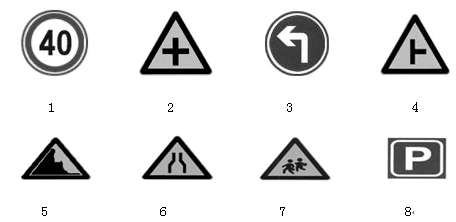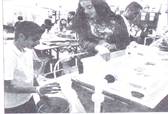题目内容
In China, the traffic keeps on the right. But when you are in England, you must be very careful because the traffic drives on the left. Before you cross a street, you must look to the right and the left. In the morning and in the evening, when people go to or come from work, the streets are very busy. Traffic is the most dangerous then.
When you are in some English cities, there are big buses with two floors, you can sit on the second floor. From there you can see the city well. It’s very interesting.
【小题1】In England the traffic moves ___.
| A.on the right | B.on the left |
| C.in the middle | D.in the park |
| A.the front | B.the right |
| C.the left | D.B and C |
| A.dangerous | B.interesting |
| C.easy | D.safe |
| A.first | B.second |
| C.third | D.fourth |
| A.front | B.left |
| C.right | D.back |
【小题1】B
【小题2】D
【小题3】A
【小题4】B
【小题5】C
解析试题分析:这篇文章讲述的英国的交通规则和中国的不同,在中国司机是靠右行驶,而在英国是靠左行驶。并且讲述了英国的交通状况。
【小题1】细节理解题。由文章信息But when you are in England, you must be very careful because the traffic drives on the left.可知,在英国司机是靠左行驶的。故选B。
【小题2】细节理解题。由文章信息Before you cross a street, you must look to the right and the left.可知,过马路时要左右看。故选D。
【小题3】细节理解题。由文章信息In the morning and in the evening, when people go to or come from work, the streets are very busy. Traffic is the most dangerous then.可知,早晨和晚上是上下班的高峰期,此时过马路非常危险。故选A
【小题4】细节理解题。由文章信息you can sit on the second floor. From there you can see the city well.可知,坐在公交车的第二层你可以很好地欣赏整座城市。故选B。
【小题5】细节理解题。由文章信息In China, the traffic keeps on the right可知,在中国驾驶是靠右行驶的。.故选C。
考点:日常生活类短文阅读。

Shyness(害羞)means feeling frightened when you’re around other people. Some children are shy. Some become very shy later because of their life experience. , everybody gets a little shy sometimes. It’s just how much they feel shy.
Most people have red faces and talk in sentences when they are shy. But some become shy that they won’t go to a restaurant because they are too nervous to and pay for their food. Some are afraid of meeting people, so they seldom go outside. This kind of shyness can be for a person.
If shyness doesn’t stop you from doing something you want to do, being shy isn’t a big . Some experts(专家)say shy people are good at working because they think more and less. But remember not to let good opportunities(机会)pass you by just because of it. If you have to sing a song at a birthday party or give some performances in front of others, just do it. There’s nothing to .
| 【小题1】 |
|
| 【小题2】 |
|
| 【小题3】 |
|
| 【小题4】 |
|
| 【小题5】 |
|
| 【小题6】 |
|
| 【小题7】 |
|
| 【小题8】 |
|
| 【小题9】 |
|
| 【小题10】 |
|
信息归纳(5分) 请仔细阅读下面一片短文, 按信息标中项目要求在答卷上的信息表中填写信息卡。
My name is Millie. I am 12 years old. My good friend Julie is 14 years old.
I always eat a lot in the morning. For breakfast, I eat an egg, some bread and drink a cup of milk. Julie seldom(很少) has breakfast. For lunch, I like noodles and chicken. Julie likes rice and beef for lunch. After lunch I often have some fruit, but Julie often has cola or ice-cream. I know they are bad for us and I seldom have them. For dinner, I always eat rice and vegetables. Julie likes meat and she doesn’t like vegetables.
I like sports. After school, I often play soccer with my classmates. I seldom watch TV. But Julie likes playing computer games very much.
Information Card
| Name | Millie | Julie |
| Age | 1 2 | 【小题1】__________________ |
| The food they have for breakfast | 【小题2】_________________ | Seldom has breakfast |
| The food they have after lunch | Some fruit | 【小题3】 |
| The food they eat for dinner | 【小题4】_____________ __ | Meat |
| Hobby | Playing sports | 【小题5】__________ ____ |
The 31st Summer Olympics will be held in Brazil in 2016. Before this global sporting event, we started thinking about sports that didn’t exist any more and sports that were maybe a little strange. Read the following ones that have ever been included in the past Olympic Games.
Live Pigeon Shooting (1900)
This bloody event was only held once, at the 1900 Paris Games. Nearly 300 birds were killed during the competition, leaving a crime scene of feathers and blood. This is the only event in Olympic history that involved killing live animals.
Kabaddi (1936)
This sport is popular in South Asia. The object is for one member of a team to enter the other side’s half of the field, and score points. The attacker then returns to his half of the field.
12 Hour Bicycle Race (1896)
Seven riders got on their bikes at 5 a.m. and rode until 5 p.m. Four riders dropped out before noon, but the winner, Adolf Schmal of Austria, managed about 180 miles. Only Schmal and one other finished.
Tug of War (1900—1920)
This may seem like a basic PE class sport more than an Olympic event, but Tug of War was actually one of the first sports played at the Olympic games in 500 BC.
There are two teams of eight; the winning team must pull the other team six feet forward.
Swimming Obstacle Race (1900)
The athletes had to climb over a pole (杆子) and a row of boats, and then swim under another row of boats. All of this was done in the Seine River, so they also had to fight against the water. This event was only ever held in 1900, in Paris.
【小题1】What do you probably think of these events?
| A.Strange. | B.Fantastic. |
| C.Modern. | D.Interesting. |
| A.Swimming Obstacle Race. | B.12 Hour Bicycle Race. |
| C.Live Pigeon Shooting. | D.Tug of War. |
| A.One. | B.Two. |
| C.Four. | D.Seven. |
| A.Give up. | B.Run out. |
| C.Fall off. | D.Break down. |
| A.Athletes took part in all of the events in teams. |
| B.Tug of War was held in the Olympics only once. |
| C.Some of the events may be in the 31st Summer Olympics. |
| D.These events are not as popular as they used to be. |
When you discuss about eating out with your friend, first of all, you must make it clear who will pay for the meal.If somebody suggests having lunch with his friend, he might simply say something like this "I'm afraid it'll have to be some place nearby ,as I have little money." The other person may say. "OK. I'll meet you at Mcdonald's." This means he has agreed that the two will go Dutch, that is, each person pays for himself. He may say "Oh, no. I want to take you for lunch at Johnson's " This means the person is to pay the bill(帐单)for both of them. Although the other person is pleased with the invitation, there is one reason why he shouldn't accept it by simply saying "Thank you."
American customs are much the same as those in other parts of the world. American women used to expect men to pay for all the meals. But today, some of them like to. However, if a woman is asked to attend a dinner or a dance outside, the invitaton itself means "Come as my guest". So, as you see, it is a polite thing to make the situation clear at the very beginning.
【小题1】 is first of all when you discuss about eating out with your friend.
| A.What to eat | B.Where to eat |
| C.Who will pay for the meal | D.When to eat |
| A.I'm afraid it will have to be some place nearby |
| B.Come as my guest |
| C.Oh, no. I want to take you for lunch at Johnson's |
| D.I don't want to go anywhere |
| A.go to Dutch |
| B.travel in Dutch |
| C.each person pays for himself |
| D.one person pays the bill for both of them |
| A.pay for the meal themselves |
| B.ask men to pay for all the meals |
| C.go Dutch |
| D.eat nothing |
| A.Eating out | B.American customs |
| C.Where to eat | D.Who pays the bill |
A sign is another kind of language. Here are some of them that you can see on the roads.
Number One is a sign with the number forty on it. When driver see this sign, they must not go at more than forty kilometers one hour. We see this sign when we are getting near a town. Number Two is a sign that we’re near a crossing. We must drive carefully. Number Three is a sign that there is a bend (弯道) on the road. Again, we must drive slowly and carefully. It is not safe to go round a bend very fast. Number Four is a sign that there is another road coming in from the right. There is a junction(交叉点) at this place.
Number Five is a sign that there is a dangerous mountain road and Number Six is a sign that the road gets narrow. Drivers must go slowly and carefully when they see these signs. Number Seven is a sign that there is a school at the side of the street or the road. Perhaps there are children going to or leaving school. So drivers must look carefully and go slowly. Number Eight is a sign with a letter “P” on it. The letter “P” means “Parking”. At some places, there are signs “NO PARKING” or “NO WAITING”. If a driver leaves his car near one of these signs, a policeman may come and write down the number of his car.
【小题1】. At the place where you see Sign 1, ________.
| A.you are already out of the town |
| B.you still have forty kilometers to go |
| C.there must be a town forty kilometers away |
| D.there must be many houses and buildings not far away |
| A.two roads cross | B.the road gets narrow |
| C.there are no traffic lights | D.people can cross the road |
| A.either of signs 2 and 3 | B.all of signs 3, 5, 6 and 7 |
| C.each of the eight signs | D.any of signs 3, 6, 7 and 8 |
| A.near Sign 8 at any time |
| B.near a sign with “NO PARKING” on it |
| C.near Sign 3 in the daytime |
| D.near a sign with “NO WAITING” if there’re no police there |
| A.show drivers the way | B.stop cars going too fast |
| C.make driving even safer | D.learn another kind of language |
Dear Sir,
I am writing to you about my stay at your hotel. My wife and I arrived on Saturday, May 15th and stayed for a week. Though we were treated well and found the service excellent, we think there are one or two things we should bring your attention.
1. We hoped for a nice holiday from our busy work lives, and your ad said “comfortable and quiet”. We want to have a chance to enjoy ourselves. However, we were always waken up by the noise every morning. Is it really necessary for the workers to start their repair work so early?
2. We hoped to swim in your “wonderful pool”. To our disappointment(失望), we found that it was closed for the whole time of our stay.
I hope you do not mind my writing to you about these things, but I would be happy if you could give me some explanation(说明). As I said at the start, it is a pity, and your service is so good in other places.
I hope to hear from you soon.
Yours sincerely
Tom Green
【小题1】Who is Mr. Tom Green probably writing this letter to?
| A.His friend. | B.The owner of a hotel. |
| C.A reader. | D.His father. |
| A.On May 15th. | B.A week ago. |
| C.Last year. | D.On a cold morning. |
| A.The hotel was very comfortable and quiet. |
| B.The workers in the hotel were very hard-working. |
| C.He thought the hotel didn’t provide them with a quiet place. |
| D.The service in the hotel was very excellent. |
| A.He felt disappointed because the swimming pool was closed for the whole time of their stay. |
| B.He felt disappointed because the swimming poop was too small. |
| C.He felt excited about it because he had a good time there. |
| D.He found it really wonderful, just like the words in the ad. |
| A.An invitation letter. | B.A thank-you letter. |
| C.A sorry letter. | D.A complaint letter. |

